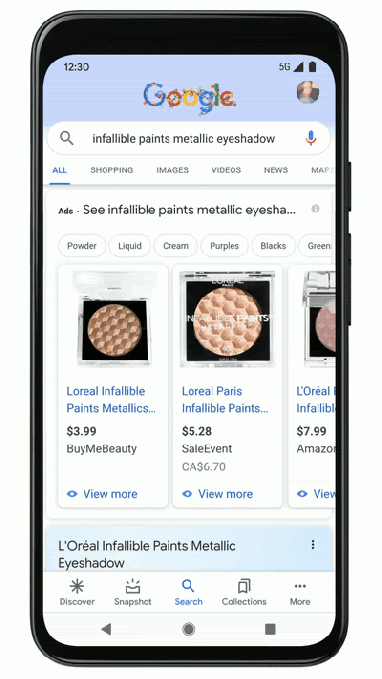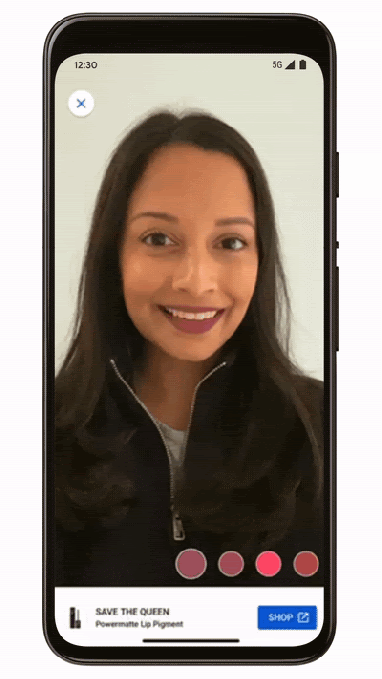
If you’ve ever used a Snapchat or Instagram filter, you know that one of the popular use cases for AR (augmented reality) is to change up your appearance with virtual makeup — like a different shade of lipstick or eyeshadow, for example. Today, Google is moving into this space, as well, with the launch of an AR-powered cosmetics try-on experience on Google Search. The company is working in partnership with top brands like L’Oréal, Estée Lauder, MAC Cosmetics, Black Opal and Charlotte Tilbury to allow consumers to try on makeup shades across a range of models with various skin tones or even on themselves using their front-facing camera on mobile devices.
Google created the new feature with help from data partners ModiFace, which offers AR tech to beauty brands, and Perfect Corp, makers of the popular YouCam Makeup app and other AR beauty tech.

Image Credits: Google
Now, when consumers search for a particular lipstick or eyeshadow product on Google — like “L’Oréal’s Infallible Paints Metallic Eyeshadow,” for example — they’ll come across the virtual try-on shopping experience at the top of their search results. From here, they can click through photos of models representing a range of skin tone to help compare the shades and find the right product for you.
To see the product on yourself, another new option will enable you to do so with your phone’s camera. In this interface, a variety of shades are shown at the bottom of the camera feed for you to tap through — much like a social media filter would offer. The experience is similar to YouTube’s AR feature for makeup try-on launched last year.

Image Credits: Google
Except in Google’s case, it’s not trying to beautify your image for the purposes of social sharing. Its aim is to connect consumers to brands for the purpose of making sales, as part of its overall investment in online shopping and, of course, its broader online advertising business.
However, the AR try-on experience itself is not considered an ad format, Google tells us, and the participating brands are not paying Google to be a part of the feature. Instead, this is a continuation of Google’s moves to open up the Google Shopping destination to more retailers. In past years, the Shopping tab had been limited to paid product listings. But earlier this year, Google announced it would make the majority of its retail listings on the Shopping tab free.
This move came at a critical time for retailers, whose businesses were being significantly impacted by physical retail store closures due to the pandemic. But Google wasn’t making the shift for altruistic reasons. The reality was that by limiting Shopping to paid ads, Google’s Shopping search results were limited, too. They also often led to out-of-stock items or had other data quality issues. Meanwhile, Amazon was ramping up its advertising business, threatening to cut into Google’s ad revenue.
Plus, many younger consumers today don’t shop on Google at all. They have been finding out about products from social media, then clicking through direct links to retailers to make purchases or even transacting directly on social platforms like Facebook or Instagram without leaving the app.
Google is entering this influencer-driven shopping market today, as well.
In addition to the AR try-on, Google will now show recommendations from beauty, apparel and home and garden enthusiasts and experts, who will talk about their favorite products in videos found in Google Shopping. For example, you can hear from professional makeup artist Jonet about makeup looks, or holiday gifts from Homesick Candles.
This feature comes from Shoploop, a product that has now graduated from Area 120, Google’s in-house incubator. It competes with efforts in video-based shopping from Facebook, Instagram and, more recently, TikTok.
The launches arrive at a time when beauty brand sales have been depressed by the pandemic, not only because of store closures and a work-from-home lifestyle, but also because it doesn’t make as much sense to wear makeup when half your face is under a mask.
The new AR try-on and the influencer videos are available in the Google app on iOS and Android.

